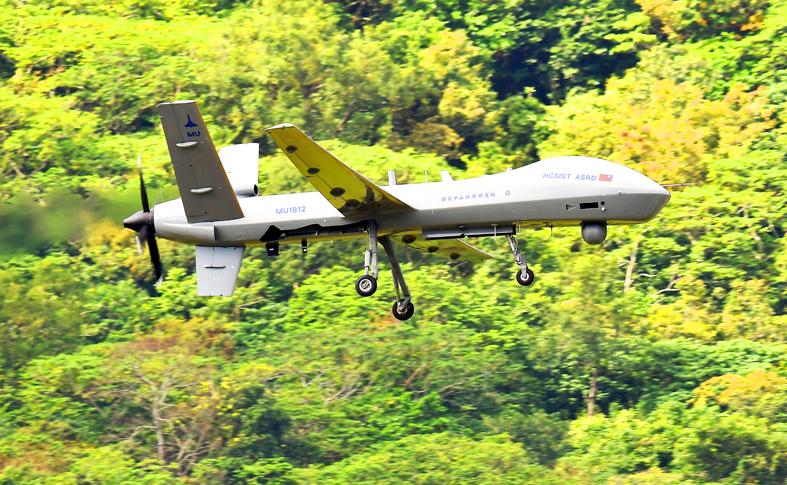A combat drone developed by the Chungshan Institute of Science and Technology (NCSIST) is undergoing initial flight tests before it enters combat testing in June, a military source said on Thursday.
Tests of the second-generation Teng Yun (騰雲), or “Cloud Rider,” prototype are being conducted after a previous version crashed in eastern Taiwan in February, delaying the drone’s development, the source said on condition of anonymity.
The second-generation prototype being tested has been upgraded from the first-generation drone, the source said, without elaborating.

Photo: Yu Tai-lang, Taipei Times
Developed by the institute, the first drone was scheduled to undergo combat testing in June this year.
The institute has attributed the crash near Taitung Air Base to “a system anomaly.”
The setback meant the institute had to push back its original schedule.
As Taiwan’s main weapons research and development unit and being affiliated with the Ministry of National Defense, the institute expects to conduct combat testing of the new drone in June, the source said.
The military has a five-step weapons development process of conceptual design, engineering development, initial testing, combat readiness testing and production.
The military source commented after Chinese-language media earlier on Thursday released a photograph of the latest-generation uncrewed combat aerial vehicle (UCAV) taken recently at eastern Hualien Air Base.
The photo shows the UCAV bearing a Republic of China flag and “NCSIST ASRD” emblazoned on the fuselage, referring to the institute’s Aeronautical Systems Research Division.
The Teng Yun is a medium-sized UCAV that resembles US-based General Atomics’ MQ-1 Predator and is compatible with the AGM-114 Hellfire air-to-surface missile. A prototype was first displayed publicly at the Taipei Aerospace and Defense Technology Exhibition in 2015.
In other military news, the air force on Wednesday took delivery of the second indigenous Advanced Jet Trainer (AJT) to roll off the production line of Aerospace Industrial Development Corp (AIDC), meeting a goal set by the government-funded company and the military.
The 1102 AJT took off at 9:20am from Taichung Air Base, where AIDC has its main operations, alongside an AJT prototype, the company said in a statement.
The new plane was piloted by AIDC chairman Hu Kai-hung (胡開宏), the statement said.
The two aircraft were joined by the 1101 AJT, the first AJT to be produced, over the ocean off Taitung before the trio landed at Taitung Air Base at about 10am, it said.
The 1101 AJT was delivered on Nov. 29.
The ministry said in a report delivered to the legislature in September that AIDC plans to deliver 66 AJTs to the air force by June 2026.
The AJT project was initiated in 2017 to replace the military’s decades-old AT-3 and F-5E/F trainers.
The development of the jet trainer, codenamed Yung Ying (勇鷹), or “Brave Eagle,” was carried out as part of the nation’s efforts to become more militarily self-reliant.

Taiwan is stepping up plans to create self-sufficient supply chains for combat drones and increase foreign orders from the US to counter China’s numerical superiority, a defense official said on Saturday. Commenting on condition of anonymity, the official said the nation’s armed forces are in agreement with US Admiral Samuel Paparo’s assessment that Taiwan’s military must be prepared to turn the nation’s waters into a “hellscape” for the Chinese People’s Liberation Army (PLA). Paparo, the commander of the US Indo-Pacific Command, reiterated the concept during a Congressional hearing in Washington on Wednesday. He first coined the term in a security conference last

Prosecutors today declined to say who was questioned regarding alleged forgery on petitions to recall Democratic Progressive Party (DPP) legislators, after Chinese-language media earlier reported that members of the Chinese Nationalist Party (KMT) Youth League were brought in for questioning. The Ministry of Justice Investigation Bureau confirmed that two people had been questioned, but did not disclose any further information about the ongoing investigation. KMT Youth League members Lee Hsiao-liang (李孝亮) and Liu Szu-yin (劉思吟) — who are leading the effort to recall DPP caucus chief executive Rosalia Wu (吳思瑤) and Legislator Wu Pei-yi (吳沛憶) — both posted on Facebook saying: “I

The Ministry of Economic Affairs has fined Taobao NT$1.2 million (US$36,912) for advertisements that exceed its approved business scope, requiring the Chinese e-commerce platform to make corrections in the first half of this year or its license may be revoked. Lawmakers have called for stricter enforcement of Chinese e-commerce platforms and measures to prevent China from laundering its goods through Taiwan in response to US President Donald Trump’s heavy tariffs on China. The Legislative Yuan’s Finance Committee met today to discuss policies to prevent China from dumping goods in Taiwan, inviting government agencies to report. Democratic Progressive Party Legislator Kuo Kuo-wen (郭國文) said

The Ministry of Economic Affairs has fined Taobao NT$1.2 million (US$36,900) for advertisements that exceeded its approved business scope and ordered the Chinese e-commerce platform to make corrections in the first half of this year or its license would be revoked. Lawmakers have called for stricter supervision of Chinese e-commerce platforms and more stringent measures to prevent China from laundering its goods through Taiwan as US President Donald Trump’s administration cracks down on origin laundering. The legislature’s Finance Committee yesterday met to discuss policies to prevent China from dumping goods in Taiwan, inviting government agencies to report on the matter. Democratic Progressive Party